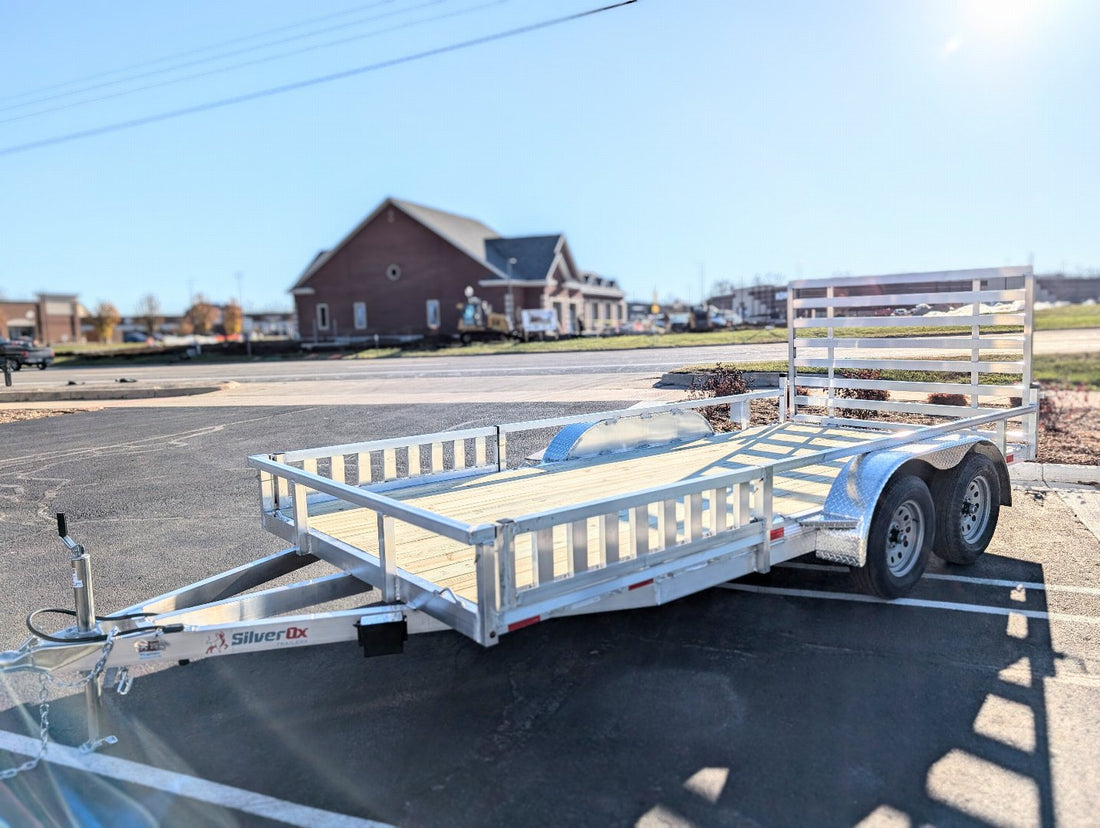
Is your Aluminum Trailer ready for the road?
Share
Aluminum Utility Trailer Maintenance: A Comprehensive Guide to Longevity
Your aluminum utility trailer is more than just a trailer; it's an investment. It's a workhorse ready for any job. But like any hard-working tool, it needs care. Simple upkeep can help avoid big problems. This guide gives you the steps to keep your trailer in great shape for years to come.
Understanding Aluminum Trailer Construction and Its Benefits
Thinking about getting a trailer? Or just want to know more about yours? Let's go over the basics. Understanding how your aluminum trailer is built and why aluminum is a great choice matters.
Why Aluminum? Corrosion Resistance and Weight Advantages
Why pick aluminum over steel? Aluminum is tough against rust. Steel can rust, weakening it over time. Aluminum won't, making it last longer.
Aluminum is also lighter. A lighter trailer means better gas mileage for your truck or car. You can also haul more stuff. Think of hauling gravel. With a lighter trailer, you can carry more gravel without straining your vehicle.
Key Components: Frame, Decking, and Fasteners
The frame is like the trailer's skeleton, giving it strength. The decking is what you load your stuff on. It can be wood or aluminum. Fasteners, like bolts, hold everything together. Each part plays a big role in keeping your trailer safe and sound. Check them regularly!
Pre-Trip Inspection Checklist: Ensuring Safety on the Road
Before you hit the road, take a few minutes. Check your trailer carefully. Spotting problems early can save you from trouble later. A pre-trip check helps make sure your haul is safe.
Lights and Electrical System: Testing and Troubleshooting
Make sure all your lights work. Brake lights, turn signals, and running lights keep you safe. Ask a friend to stand behind the trailer. Then, check the lights as you use the brakes and signals. If a light doesn't work, it might be a loose wire or a blown fuse. A circuit tester helps find electrical issues.
Tires and Wheels: Pressure, Tread, and Lug Nuts
Tires are key for a smooth and safe trip. Check your tire pressure. The right pressure is on a sticker on the trailer or in your owner's manual. Check the tire tread too. If it's worn down, it's time for new tires. Make sure your lug nuts are tight. Use a torque wrench to tighten them just right.
Coupler, Chains, and Safety Cables: Secure Connections
The coupler connects your trailer to your vehicle. Make sure it's locked tight. Safety chains are a backup. Cross them under the coupler. This way, if the coupler fails, the trailer won't go it's own way. The breakaway cable activates the trailer brakes if it comes loose. Make sure it's hooked up right and in good shape.
Routine Maintenance: Extending the Life of Your Trailer
Regular care keeps your trailer in tip-top shape. It helps avoid big repairs down the road. A little work now saves you money and stress later.
Washing and Cleaning: Removing Dirt and Debris
Wash your aluminum trailer often. Dirt and salt can cause problems. Use soap made for cars or trailers. Rinse well. This keeps the aluminum shiny and new.
Decking Care: Protecting Wood or Aluminum Surfaces
The trailer deck needs love too. If it's wood, use a sealer to keep out water. For aluminum decks, just keep them clean. Check for damage, like cracks or dents. Fix them fast.
Lubrication: Axles, Hinges, and Moving Parts
Keep things moving smoothly. Grease the axles, hinges, and latches. Use grease made for trailers. This keeps them from rusting or getting stuck. Regular grease jobs make a big difference.
Addressing Common Issues: Troubleshooting and Repairs
Even with care, problems can pop up. Knowing how to deal with them helps you keep your trailer running strong. Let's look at some common issues and how to fix them.
Aluminum Corrosion: Prevention and Treatment
Aluminum can corrode, even if it doesn't rust like steel. Look for white powder on the aluminum. This is corrosion. Clean it off with a brush and special cleaner. Then, use a coating to protect it.
Wiring Problems: Repairing Lights and Connections
Wiring can get damaged. If your lights don't work, check the wires. Look for cuts or loose ends. Replace bad wires and tighten connections. Always disconnect the power before working on wires.
Fastener Replacement: Selecting the Right Hardware
Bolts and screws can rust or break. Replace them with the right kind. Use stainless steel or aluminum fasteners. They last longer. Make sure they're the right size and strength.
Storage Tips: Protecting Your Trailer During Off-Season
When you're not using your trailer, store it right. This protects it from weather and damage. Good storage means a longer life for your trailer.
Covering and Protection from the Elements
A cover keeps rain, snow, and sun off your trailer. This keeps it looking good and prevents damage. Make sure the cover fits well and is secure.
Tire Storage: Preventing Dry Rot and Flat Spots
Tires can rot or get flat spots when stored. Cover them or take them off. Store them in a cool, dry place. Keep the right amount of air in them.
Conclusion: Investing in Longevity
Taking care of your aluminum utility trailer isn't hard. Regular checks, cleaning, and storage keep it in great shape. Doing these things keeps you safe and saves money. A well-kept trailer lasts longer and hauls better.

